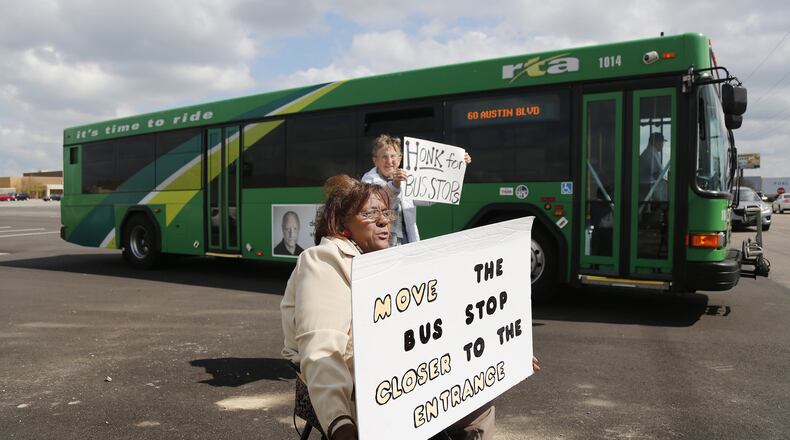“We’ve been on this for I don’t know how many years,” said Ewers, who represents Leaders for Equality and Action in Dayton (LEAD). “It’s still over 600 feet and people with any kind of disability it makes it that much harder to get in there.”
Ewers and others protested recently on Mall Ring Road south of the mall where buses currently drop off riders.
The lawsuit, filed last December, said the mall is discriminating against the disabled and violating the Americans with Disabilities Act by not providing easier access. The lawsuit doesn’t seek monetary damages but asks the court to require the mall to allow buses to stop at entrances.
The mall installed a new sidewalk from the bus stop to the mall on Sept. 30, a welcome but less-than-half measure, said Greg Kramer with Access Center for Independent Living and one of the lawsuit plaintiffs.
“This walkway kind of solves some of the safety issues,” said Kramer who is quadriplegic and uses a wheelchair. “You don’t have to go through the parking lot, but it’s still a huge distance away and for somebody like myself, if it’s 90 degrees out or if it’s zero degrees out, I could not push that.”
Defendants in the lawsuit named are the mall’s owner, WP Glimcher Inc., Dayton Mall II, LLC., Dayton Mall Ventures, LLC and stores at the mall including Macy’s Retail Holdings, Inc.; Elder Ohio Delaware Business Trust; the Bon-Ton Department Stores Inc.; and Sears Roebuck and Co.
“We do not comment on pending litigation,” said David Duebber, the Dayton mall general manager, in a written comment.
A U.S. District Court, Southern District of Ohio jury trial is scheduled for July 17, 2017.
Jeremy Morris, executive director of Access Center for Independent Living, said a bus stop near a south mall entrance close to Macy’s wouldn’t impede shoppers or hurt the mall or its tenants monetarily.
“This entrance here is not going to disrupt traffic,” Morris said. “We’re not asking right in the front main entrance where you have a lot of traffic and it could cause some congestion. This is a reasonable entrance that they could allow a bus stop to come to. There’s plenty of room to get through. There’s plenty of streetway for the bus to be able to drive through.”
The LEAD group and others including Advocates for Basic Legal Equality (ABLE) led a successful 2013 legal effort to get RTA buses access to Beavercreek near the Mall at Fairfield Commons. Following a Federal Highway Administration’s Office of Civil Rights probe, Beavercreek stood to lose millions of federal transportation dollars in transportation unless the city acted on Federal Highway Administration recommendations to place bus stops near the mall in Greene County.

